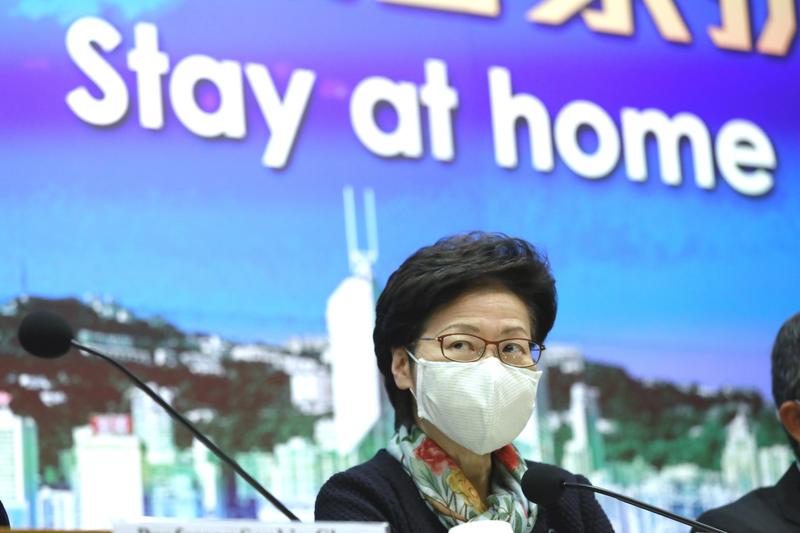 Chief Executive Carrie Lam Cheng Yuet-ngor announces during a press conference new measures that tightened Hong Kong's social distancing rules to stop the spread of COVID-19 on Nov 30, 2020. (PHOTO PROVIDED TO CHINA DAILY)
Chief Executive Carrie Lam Cheng Yuet-ngor announces during a press conference new measures that tightened Hong Kong's social distancing rules to stop the spread of COVID-19 on Nov 30, 2020. (PHOTO PROVIDED TO CHINA DAILY)
HONG KONG - Most of Hong Kong’s nearly 180,000 civil servants will again work from home starting Wednesday as the city saw 76 new COVID-19 cases on Monday.
In a press briefing on Monday afternoon, Chief Executive Carrie Lam Cheng Yuet-ngor also announced measures that tightened Hong Kong's social distancing rules to stop the spread of the virus.
She also said that the government will “more than double” the current fixed penalty of HK$2,000 (US$258) for violations of anti-virus regulations such as the gathering ban, mandatory mask-wearing order, and mandatory testing order.
Lam said a hotline will be established to encourage residents to report relevant contraventions to the authorities. Details will be deliberated during the upcoming Executive Council meeting,she added.
Lam said that most of the city’s civil service will work from home for two weeks and only emergency and essential services will be maintained, noting that as many as nine civil servants were infected recently.
ALSO READ: HK to suspend all in-person classes as city sees 115 new cases
Over the past week, the city recorded a daily average of 87 new infections, 90 percent of which were local cases while more than 100 were untraceable, Lam said, quoting data from health authorities.
Over the past week, the city recorded a daily average of 87 new infections, 90 percent of which were local cases while more than 100 were untraceable, Chief Executive Carrie Lam Cheng Yuet-ngor
Of the 76 fresh infections on Monday, 68 were locally transmitted, including nine of unknown origin, Chuang Shuk Kwan, a Centre for Health Protection official, said in a separate press conference.
Chuang said 40 of the local cases were linked to the dance club cluster while 19 infections were detected at the community testing centers. Around 50 people tested preliminarily positive.
The city’s total of confirmed cases stood at 6,314, with 109 related fatalities.
Tightening anti-virus curbs, Lam said that only up to two people per group will be allowed to gather in public starting Wednesday while karaoke lounges, game centers, swimming pools, mahjong parlors and amusement parks will be shut.
The government had earlier closed down bars, bathhouses, nightclubs and party rooms. But this time around, fitness clubs, sports venues, and beauty and massage salons will be allowed to continue their operations with stringent anti-virus measures.
Lam said the government decided to do this for the mental and physical health of Hong Kong residents.
ALSO READ: Zero infection, economic revival pledged in 4th Policy Address
Also starting Wednesday, no more than two diners will be allowed per table at local restaurants, down from four previously. Dine-in services at restaurants will end at 10 pm.
The latest wave of COVID-19 outbreaks was centered around a cluster related to dance studios, which at least had 519 infections.
Lam said it was very difficult for health officials to conduct contact tracing because many of the patients were found to have participated in many social activities.
She said two hotels will be enlisted to serve as quarantine centers to provide a total of about 800 rooms for returnees. Lam also said the government will set up five more community testing centers in addition to the current nine across the city.
READ MORE: Hospital Authority apologizes for virus test results mix-up
The new measures were announced after consultations during the weekend with the government’s four public health expert advisers, who agreed that the city’s fourth wave of infections could continue to worsen, Lam said.
Ciitng the four experts, Lam reiterated that mandatory universal testing was not an option for the city as it is not an “effective” and scientifically based” choice.


